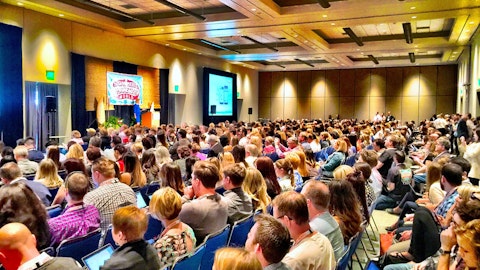Luis von Ahn: Yes, I mean, it’s India’s very interesting. I mean, we’ve grown DAUs a lot in India, which is great. We do see significantly lower payer conversion. And that’s expected when we talk to other companies that are subscription based. It’s very hard to get payer conversion in India to go up. We have — the price of the subscription in India is lower. My sense is that this is just we’re going to continue doing things with India. But my sense is this is just a market that needs to mature a little bit in terms of people being okay with digital subscriptions. So, the way we see it is this is this is a great opportunity, but more in the midterm rather than in the short term, because, we’re going to continue trying things like in-app purchases with India and stuff like that.
But for the subscription, even if you look at, if you look at companies like Spotify or other subscription businesses, it’s just India. It’s hard to get users to become digital subscribers. But I think that is changing over time. And I think if you look at it over kind of the next five years, you’ll probably see an increase.
Arvind Ramnani: Yes, yes, perfect. That’s helpful. And I guess, Matt, one for you, in terms of like margins, right? I mean, and maybe you don’t think of it this way, but when you think of your various cohorts, whether it’s Max or like Family Plans, and I know you don’t disclose it, but in general, where do margins come in in each of these different cohorts? Because kind of one thing is, yes, it’s exciting, but it’s also not cheap.
Matt Skaruppa: Sure. Yes. And we’ve we talked about this on our actually about a year ago, Arvind, we talked about the fact that for Max, it’s there’s incremental cost for every use case for every usage of it. And that does lower the gross margin of the Max product. But in an absolute dollar margin basis, because of the way we’ve priced it, at least to date, on an absolute dollar margin basis, you’re better off even with the prices that were happening last year. So again, I don’t want you to take away from that, that that’s where this ends. I think that’s where it starts. And we’re going to experiment with the price and the costs are changing relatively rapidly. So right now, I feel pretty good about our dollar margin on Max. And I think ultimately, the gross margin will be just fine.
Arvind Ramnani: Terrific. And just last question for me. Last year, you had a lot of, kind of basically free, sort of quasi free marketing, whether it is a form of the kind of Barbie movie and all of that. And I think when we met last time, we were saying, a lot of that just basically came to you. Is there anything you’re able to do in your business this year where you were able to kind of leverage some of that, that kind of basically free, free marketing from kind of popular events?
Matt Skaruppa: Yes, we expect similar stuff to last year. I mean, some of these, we expect similar stuff to last year in terms of the volume of these. Some of them are outsized in terms of the impact, and that’s very hard to know which one’s going to be outsized. But we have a lot of things that are coming to us basically for free, mainly because we are a brand that has just struck a chord. And so we’re seeing that. It’s hard to know whether the things that we have visibility towards for the rest of the year are going to be as big as the Barbie movie. It’s very hard to say, but I can tell you that in terms of number of opportunities, it’s probably even higher than last year. So we’re just, I think there’s just a lot to that.
We were talking right before the call. We finally cracked Dua Lipa. She finally cracked. She finally mentioned us. We’ve been simping her for like years. She finally mentioned the word Duolingo in some interview. So that’s the type of stuff that we see. It’s just entirely for free. And we see, a lot of those things are happening.
Arvind Ramnani: Terrific. Hopefully you’ll see Dua Lipa at the next investor day.
Matt Skaruppa: Yes. Who knows? We’ll see.
Arvind Ramnani: Great. Thank you so much. All right.
Deborah Belevan: All right. Thanks, everyone. I’m not showing any further questions. I’ll turn it back to Luis for closing remarks. Oh, just. Oh, I’m sorry. Curtis just got his hand up at the very last second. Curtis.
Unidentified Analyst: Sorry about that. I think I raised it somehow. But just a quick one on the music. I think you mentioned that there’s going to be working on some new features in terms of, I guess, integration with musical instruments. Just curious a little bit more in terms of what that is and how much of, I guess, an unlock. And I don’t know if you’ve mentioned this before. Forgive me. But how big is that market in terms of at least TAM?
Matt Skaruppa: Yes. So for music, we’re working on a number of things. What we have is, we’ve only had the music course out for, I don’t know what, about four months, five months, you know, a few months. And so we’re still adding a lot of features. We know that a lot of people who want to learn music actually want to learn how to play an instrument. Today with our music course, we have kind of like a phone piano thing. Like, I mean, you can just get the tap on the phone. So, over time, we’re going to do musical instrument integration. Another thing that we know people want and that we are going to have is licensed music. Right now, all the music is, stuff that is in the free domain, which usually means very old songs. We’re going to, we’re going to be adding licensed music as well, which is what people want to do.
So we think there’s a lot of opportunity there to get people to, have a– it’s going to be a really fun music learning experience. In terms of the TAM, we’ve looked into this. There’s a lot of people learning music. So that’s good. It’s hard to say exactly for the TAM because what we want to do for music is the same thing we did for language learning, which in fact grew the TAM. For example, in the United States, 80% of our users for language learning were not learning a language before Duolingo. So we’ve just grown the market and that’s kind of what we want to do with music. It’s hard to say exactly what it is. I don’t think it’s going to be as big as language learning, but I’m hoping for a significant fraction of language learning at least.
Unidentified Analyst: Just a quick follow up on that question or that point on licensed music. Would that require some form of modernization, to support that cost?
Matt Skaruppa: Yes, we would have to do that. I mean, it’s of course the details are still up in the air, but, it would have to be the case that only the payers or at least, the payers get the full experience or something like that. It’ll have to be basically something to support that.
Unidentified Analyst: Okay, very good. Appreciate it.
Deborah Belevan: Okay, that’s the last question. So I’ll turn back to Luis to close up.
Luis von Ahn: Well, just thank you, Debbie. I’d just like to thank everyone for joining us and we look forward to speaking to you next quarter. Do your lessons, learn some music and have a great evening.
Follow Duolingo Inc. (NASDAQ:DUOL)
Follow Duolingo Inc. (NASDAQ:DUOL)
Receive real-time insider trading and news alerts





